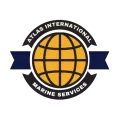
Exhaust Gas Cleaning Systems, also known as scrubbers, are an innovative technology that address the environmental impact of the maritime industry.
Ships are recognized to produce significant air pollution by discharging exhaust gases, mainly sulphur oxides (SOx), nitrogen oxides (NOx), and particulate matter (PM).
The International Maritime Organization (IMO) has introduced many regulations to reduce air pollution and greenhouse gas emissions.
But scrubbers are one of the most efficient ways of reducing the environmental impact of shipping.
The global maritime industry is responsible for producing around 940 million tons of carbon dioxide (CO2) every year.
It is estimated that international shipping accounts for around 2.2% of global CO2 emissions.
Despite accounting for a relatively small proportion of gas emissions, the shipping industry is committed to reducing its impact and being part of the global fight against climate change.
An Innovative Solution
Exhaust Gas Cleaning Systems are an innovative solution implemented by ship owners to reduce their environmental footprint.
Scrubbers work by removing pollutants and particulate matter from the exhaust fumes produced by marine engines.
The systems consist of a variety of technologies that typically employ the process of washing and purifying emissions.
Types Of Scrubber
The two most common types of scrubber are closed-loop and open-loop scrubbers.
– Closed-Loop
Closed-loop scrubbers work by mixing seawater with a buffering agent that neutralizes the acidic exhaust fumes.
The neutralized mixture is then returned to the ocean, reducing the release of acidic pollutants.
This type of scrubber is primarily employed in zones with a limited water supply or where the discharge of effluent can be problematic.
– Open-Loop
Open-loop scrubbers, on the other hand, use seawater as a medium for scrubbing the exhaust gases.
The seawater reacts with the sulfur dioxide (SO2) in the exhaust gas to form sulfate particles, which then settle on the sludge waste.
The residual seawater is discharged into the surrounding waters. This type of scrubber requires a great deal of seawater, making it less suitable for areas with a limited water supply.

The Controversy
Although scrubbers have been praised for their environmental benefits, they have also courted controversy among some quarters.
Environmental advocates argue that open-loop scrubbers can increase pollution in waterways due to the amount of effluent discharged.
At the same time, some experts have pointed out that the cost of installing a closed-loop scrubber is relatively high.
A Potential Tool
Despite the controversies, scrubbers have emerged as a critical tool in the fight against climate change in the shipping industry.
Many firms see scrubbers as a means of reducing their environmental footprint and achieving regulatory compliance.
The IMO has introduced a range of regulations requiring ships to limit their emissions and use of low-sulfur grade fuel oils.
Cost-Effective
Scrubbers are considered a compliant and cost-effective means by which ship owners can meet these regulations while continuing to use less expensive high sulfur fuel oils.
In addition to reducing air pollution, scrubbers can also make economic sense for ship owners.
The installation of scrubbers can be expensive, but the use of high sulfur fuel oils can be cheaper than low sulfur fuel oils.
By using scrubbers, owners can save on fuel costs while meeting environmental regulations.
The implementation of Exhaust Gas Cleaning Systems is gaining popularity in the shipping industry.
As of early 2020, there were over 4,000 ships fitted with scrubbers, providing an estimated installed scrubber capacity of over 50 million tons.
A Developing Technology
Moreover, scrubbers are a developing technology, and its manufacturers are working to enhance the effectiveness and efficiency of these systems.
Another aspect to be considered is that, while scrubbers play a vital role in improving the environmental footprint of the shipping industry, they are not a silver bullet.
Shipping companies must pursue multiple strategies to reduce their carbon footprint, including the use of alternative fuels, energy-efficient vessel design, and operational optimization.
In Conclusion
Exhaust Gas Cleaning Systems are an innovative solution implemented by ship owners to reduce their environmental impact.
Despite some controversies surrounding the technology, scrubbers are emerging as a critical tool in reducing air pollution from the shipping industry.
Scrubbers can provide an economic advantage, but they should be used in conjunction with other strategies to ensure a reduction in carbon emissions.
As the industry continues to grow, the use of scrubbers and other solutions is likely to become even more widespread in the coming years.
Don’t let your vessel go without the essentials. Contact us today for reliable and efficient marine services.
